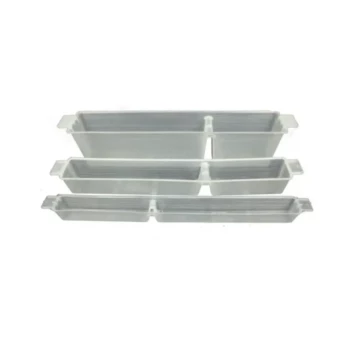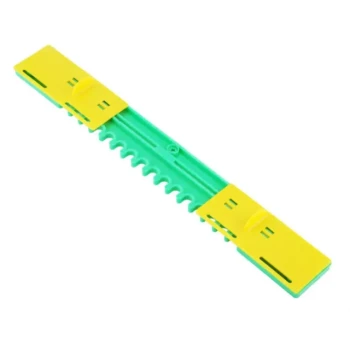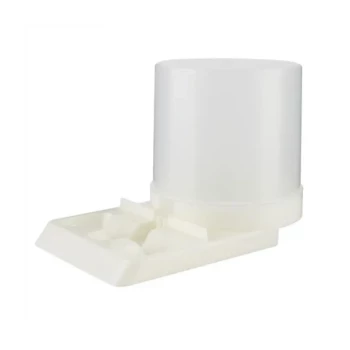The most common reasons for using a nucleus hive (nuc) are to manage swarming, handle queen issues, strengthen colonies, and increase your hive count. These small, self-contained colonies are not just for starting new hives; they are one of the most versatile and indispensable management tools available to a beekeeper for maintaining apiary health and productivity.
A nucleus hive is far more than just a small bee colony. It is a strategic resource that allows a beekeeper to proactively solve problems, manage population dynamics, and create resilience across their entire apiary.
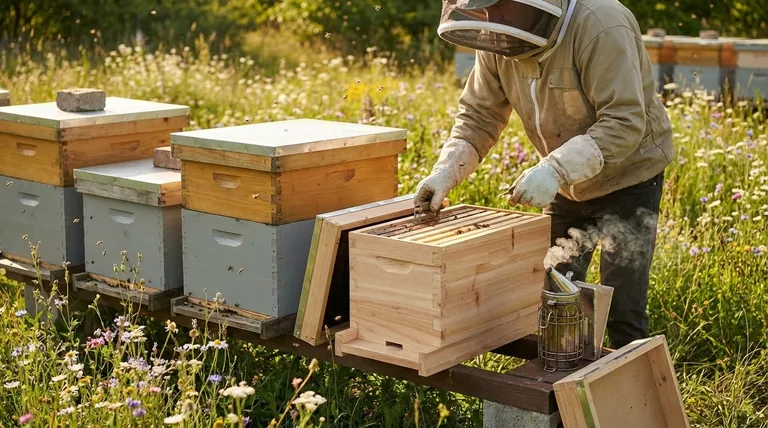
Proactive Hive Management
A primary function of a nuc is to give you direct control over the population dynamics and overall strength of your production hives.
1. Alleviating Swarm Tendencies
When a strong colony becomes too crowded, its natural instinct is to swarm, which significantly reduces your workforce and potential honey crop.
By removing a few frames of brood, bees, and the queen from the crowded hive to create a nuc, you effectively relieve this congestion. This action simulates a swarm, satisfying the bees' instinct and keeping the majority of the foraging force in the original hive.
2. Keeping Production Colonies Strong
A nuc can act as a "brood factory" in support of your main hives.
You can continuously pull frames of sealed brood from your strongest hives to create and maintain nucs. Later, just before a major nectar flow, you can return these frames of emerging bees to the production hives, massively boosting their population at the perfect time.
3. Strengthening Weak Colonies
Conversely, a nuc is the perfect tool for saving a weak or struggling colony.
A healthy nuc produces an excess of brood and bees. You can donate frames of sealed brood from the nuc to a weaker hive, boosting its population and helping it recover without putting your stronger production colonies at risk.
Solving Critical Queen Issues
Queen failure is one of the most urgent and potentially devastating problems a beekeeper can face. A nuc is your insurance policy.
4. Dealing with Untimely Queen Problems
If a production hive suddenly becomes queenless, finding and introducing a new, mated queen can take days or even weeks.
A queenright nuc provides an immediate solution. You can simply unite the nuc with the queenless colony, providing it with a laying queen and frames of her own brood, which ensures a much higher acceptance rate and minimizes the break in the colony's brood cycle.
Apiary Growth and Expansion
Nucs are the fundamental building blocks for sustainably growing your beekeeping operation, whether for hobby or business.
5. Making Colony Increases
Using nucs is the most reliable way to increase your hive count. It's a controlled "split" that ensures the new colony has all the resources it needs to thrive.
Unlike catching a wild swarm, creating a nuc allows you to select the genetic stock from your best-performing hives, propagating desirable traits like gentleness and productivity.
6. Adding Value by Selling Nucs
Nucs are a high-demand, valuable product. For beekeepers looking to generate income, raising and selling nucs is often more profitable and less labor-intensive than producing honey.
This creates a sustainable enterprise where you can profit from the natural growth of your colonies.
Understanding the Trade-offs
While incredibly useful, integrating nucs into your management strategy requires a clear understanding of the commitments.
The Resource Commitment
Nucs are not "set-it-and-forget-it" tools. They require their own equipment (nuc boxes), regular inspections, and resource management, just like a full-sized hive.
Potential for Weakness
Because of their small size, nucs can be vulnerable to pests like wax moths and robbing by stronger hives if not managed carefully. They require a vigilant beekeeper to ensure they remain healthy and growing.
Equipment Compatibility
Standardizing your equipment is crucial for efficiency. Five-frame nucs are often preferred because their frames are interchangeable with standard Langstroth hive bodies, and they can accommodate tools like queen excluders or small feeders.
Making the Right Choice for Your Goal
How you use a nuc depends entirely on your primary objective.
- If your primary focus is honey production: Use nucs as support units to prevent swarming and boost the populations of your main hives right before the nectar flow.
- If your primary focus is apiary health and resilience: Maintain queenright nucs at all times as an immediate resource for requeening failed colonies or bolstering weak ones.
- If your primary focus is growth and expansion: Use nucs as your primary method for making controlled splits and raising new colonies for your own apiary or for sale.
Ultimately, mastering the use of nucleus hives transforms you from a reactive beekeeper into a strategic apiary manager.
Summary Table:
| Reason | Primary Benefit | Key Application |
|---|---|---|
| 1. Alleviate Swarming | Maintains honey production workforce | Proactive hive management |
| 2. Strengthen Colonies | Boosts population before nectar flow | Support for production hives |
| 3. Bolster Weak Hives | Aids recovery without risk to strong hives | Apiary health maintenance |
| 4. Solve Queen Issues | Provides immediate, mated queen replacement | Emergency requeening |
| 5. Increase Hive Count | Controlled, reliable colony expansion | Sustainable apiary growth |
| 6. Sell for Profit | High-demand, valuable product | Income generation |
| 7. Propagate Genetics | Selects for desirable traits like gentleness | Breeding program enhancement |
Ready to integrate nucs into your beekeeping operation for superior apiary management?
HONESTBEE supplies commercial apiaries and beekeeping equipment distributors with the high-quality, wholesale-focused supplies needed to build and manage productive nucleus hives. From durable nuc boxes to essential tools, we provide the reliable equipment that supports your strategic goals—whether it's maximizing honey production, ensuring apiary resilience, or driving business growth.
Contact HONESTBEE today to discuss your wholesale needs and discover how our beekeeping supplies can strengthen your operation.
Visual Guide
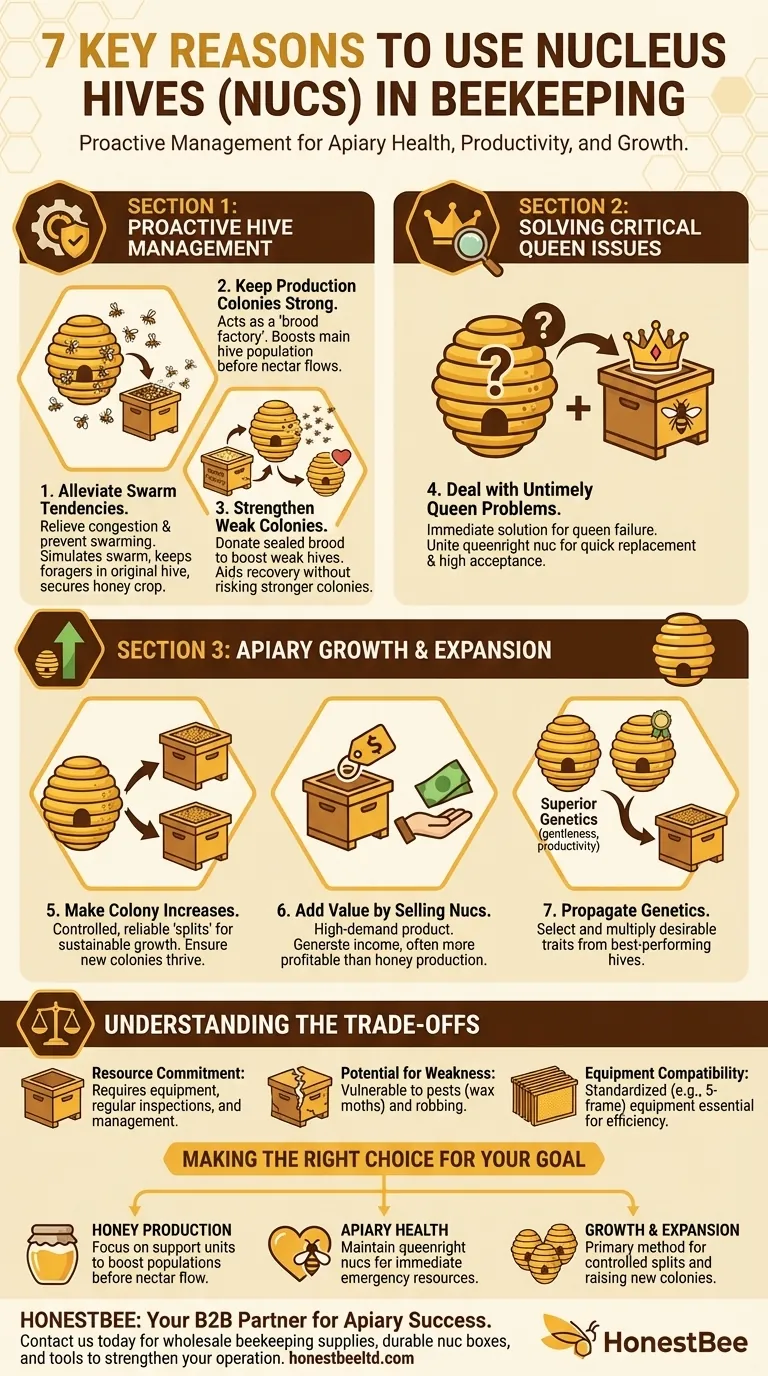
Related Products
- 5 Frame Wooden Nuc Box for Beekeeping
- Twin Queen Styrofoam Honey Bee Nucs Mating and Breeding Box
- Automatic Heat Preservation 6 Frame Pro Nuc Box for Honey Bee Queen Mating
- Plastic Transporting Bee Packages and Nuc Boxes for Beekeeping
- Styrofoam Mini Mating Nuc Box with Frames Feeder Styrofoam Bee Hives 3 Frame Nuc Box
People Also Ask
- When can nucleus colonies (nucs) be created? Optimal Timing for Apiary Growth and Survival
- What is a common feature of many 5-frame nuc boxes? The Integrated Feeder for Efficient Colony Growth
- What is the most common type of standard nuc? The 5-Frame Nuc Explained
- What is the advantage of overwintering a nucleus? A Strategic Asset for Beekeeping Success
- How many frames does a typical wooden nuc box hold? A Guide to Choosing the Right Size












